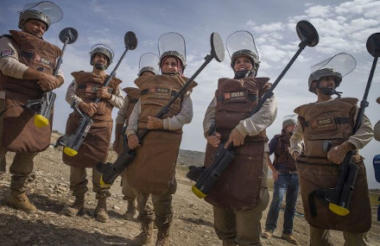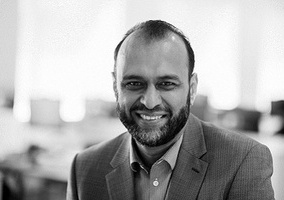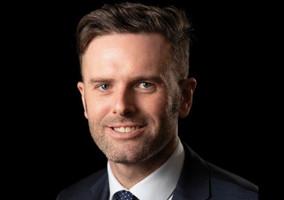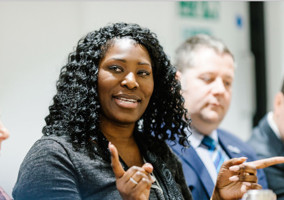Leading a global organisation of 5,000 staff working in 26 countries amidst the loss, suffering, and disruption of a worldwide pandemic would not have been the backdrop I would have chosen for my first ever chief executive role.
However, looking back a year on, there is so much of which to be proud. Whilst there have been difficulties, Mines Advisory Group (MAG) has, by and large, navigated this last year well — continuing to save lives and delivering to plan and on budget. We have stayed alert to change and reacted with agility. Our staff around the world continue to drive our success with their resilience and dedication.
As the new chief executive of an organisation to which I have committed the last 12 years of my career, I focused on three key priorities to steer MAG through a turbulent year.
Communicating clearly, regularly and with authenticity
The disruption of the pandemic affected everybody and every part of MAG. Necessary lockdowns and restrictions hampered our ability to carry out operational work on the ground. While the scale of the crisis also impacted the funding environment. In particular, cuts to the UK Aid budget — made in the name of cost-cutting due to the pandemic — have hit MAG like many other humanitarian organisations.
In the face of this uncertainty, I have sought to be as transparent as possible with staff. Critical to this has been effective internal communications to connect staff, both to one another, but also to leadership. I believe MAG’s full potential can be reached by building a collaborative culture.
Putting staff first, ensuring our duty of care
None of what MAG does would be possible without our staff, many of whom put their own lives on the line to keep others safe. Through the difficulties of Covid-19, ensuring their wellbeing, both physical and mental, has been a priority.
With thousands of colleagues working in a wide variety of contexts, maintaining a global mindset has been crucial. From Angola to Vietnam, from Burkina Faso to the UK, the pandemic has played out differently.
There are no quick fixes, and no one solution can work for everybody. In practice, this means trusting our people on the ground. I worked to empower regional and national teams to lead on Covid-19 risk management measures, including decisions around implementing safety protocols beyond national minimum guidelines to keep staff safe.
At the same time, MAG has invested in mental health initiatives for staff, ranging from practical guidance and support to improve work/life balance to offering our first ever Employee Assistance Programme. At the push of a button, the tool gives staff access to qualified counselling services within hours.
Mission focus to ensure sustainability
Whatever impacts we have felt at HQ, we have remained acutely aware that it is the lives of the poorest and most vulnerable that have been hit hardest by Covid-19.
More than 60 million people live with the daily danger of landmines and unexploded bombs, whilst millions more face the risks posed by illicit gun trafficking and poorly stored weapons and ammunition. As global experts in the humanitarian disarmament sector, I made it clear that the people MAG exists to support must remain our priority. Getting back to work as quickly and safely as possible was key. As was highlighting the impact aid cuts will have on the communities in which we work.
Not only did Covid-19 restrictions make it more challenging to do our day-to-day work, but they also created new threats. In Iraq, for example, restrictions designed to curb the spread of the virus had the knock-on effect for the most vulnerable people living in camps for internally displaced people (IDP). The restriction meant families would have to halt their precarious livelihoods outside the camps. Hundreds of families fled the camps to return home to Sinjar — a region littered with the improvised landmines laid by ISIS.
Our teams found ways to overcome these new challenges. For instance, to reach the estimated 500 returning families, our community liaison staff in Iraq launched a telephone initiative to deliver life-saving lessons to alert them to the danger and help them stay safe.
Ultimately, thanks to our innovative and determined staff, MAG continued to perform well in 2020, as it had in 2019, in terms of the amount of land we were able to make safe from landmines and unexploded bombs.
What have I learned, what’s next?
I'm very proud of what MAG has achieved over the past year. But there is no doubt I didn't get everything right.
One of the things I made clear when I started as chief executive was that I wanted MAG to rediscover our confidence and become a more characterful, values-driven organisation that spoke out when it needed to on behalf of people affected by conflict.
However, in practice, developing that voice and those reflexes takes time. When George Floyd's murder sparked a global Black Lives Matter moment, we weren’t immediately sure how to react.
Contradictory thoughts circled; did saying nothing say something? Did we risk being opportunistic and inauthentic by speaking out when we knew MAG, and the wider sector, has a lot of work to do on diversity and inclusion?
When we did eventually speak, we did so with a commitment to action. And whilst, on reflection, I would have spoken sooner, the process has been invaluable, making us more confident about using our voice and driving a new strand of work as we improve MAG’s approach to diversity and inclusion. Change takes time, but I am committed to action and confident we're going in the right direction.
In a dynamic world, MAG has, over the last year, identified and reacted to change. As we look forward, guided by an updated strategy, there is much about which to be excited. I am committed to an ambitious agenda for change that will ensure MAG is a more sustainable, values-led organisation committed, more than ever, to saving lives and building safer futures for communities impacted by conflict around the world.
Darren Cormack is chief executive of Mines Advisory Group
Related Articles
Javed Khan: ‘Demand has risen, resources have fallen - that perfect storm worries me’
Javed Khan, chief executive of Barnardo’s, talks about the financial drop his charity is facing, the increase in those needing support, the 'charity halo', and his hopes for the sector.
Ndidi Okezie: 'Covid-19 has shone a spotlight on inequalities that charities have been trying to bang the drum on'
Ndidi Okezie, chief executive of UK Youth, speaks to Harriet Whitehead about her goals for the charity, the #YoungAndBlack campaign, and the importance of collaboration












